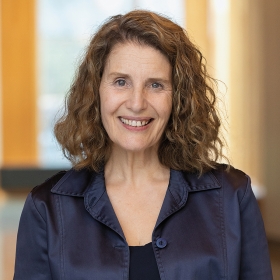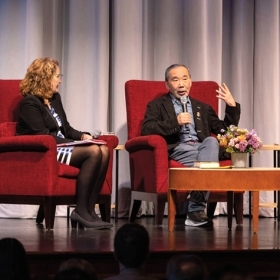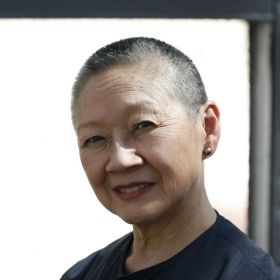“Ever since I arrived at Wellesley in 2002, I have had students, time and time again, come to me and say, ‘I want to do a thesis on Haruki Murakami,’ or ‘I want to do an independent study on Murakami,’” says Eve Zimmerman, professor of Japanese.

“Ever since I arrived at Wellesley in 2002, I have had students, time and time again, come to me and say, ‘I want to do a thesis on Haruki Murakami,’ or ‘I want to do an independent study on Murakami,’” says Eve Zimmerman, professor of Japanese. “I read so much of his work because of Wellesley students. And I became very interested in what young women, what young people, find in his work.”
To explore this question and more, Zimmerman, who this summer ended her term as director of the Suzy Newhouse Center for the Humanities, offered a 300-level, immersive class, taught in English, to explore the iconic Japanese author’s work. And it just so happened that Murakami himself was down the hall, spending spring semester on campus as the Mary L. Cornille Distinguished Visiting Professor in the Humanities.
Zimmerman says Murakami’s fiction proffers a vision of individual potential and promise. “Even though you’re lonely and alienated, there’s a quest that you’re on, an adventure,” she says. That appeals to students, especially “the self-selected group that comes to Wellesley. They’re adventurous, they have a purpose. They may not be sure what it is yet, they may be confused. But, like Murakami’s characters, they find their way.”
Murakami and his wife, Yoko, visited Zimmerman’s class and greatly enjoyed it, she says. “He talked about how in his work he’s creating an alternate world in which this would have happened if I had made a certain choice. If I had taken this other road, then my life would have turned out this way. It’s very existential, and students like that.” She says a huge part of being a college student is posing Murakami-like questions to oneself: “If I make this choice today, what happens to me down the road?”
Students in the class represented a range of disciplines, from art to environmental science, chemistry to English to Japanese. “We’ve got an economics major who’s also doing an honors thesis in Japanese literature,” says Zimmerman.
Zimmerman considered including other contemporary Japanese writers in the course. “That was my initial idea,” she says. “But when I went to put the syllabus together, I realized that there’s so much Murakami to read. What do we leave out? There’s such a difference between the long novels and the short stories, and I wanted to give plenty of time to the short stories.”
Murakami delivered the Cornille Lecture, titled “Writing in an Age of Covid and War,” in which he introduced his most recent novel, the first in six years. (See “A Storyteller Among Us.”) During his semester on campus, he also offered a seminar to faculty analyzing his short stories written from a female perspective. And with his wife, he visited the Wellesley Japan Club, where 30 students gathered on a Sunday afternoon to socialize with the couple. “They’re such generous people, the Murakamis,” Zimmerman says. “If it’s Wellesley students, they say yes.”
[substory:1]

